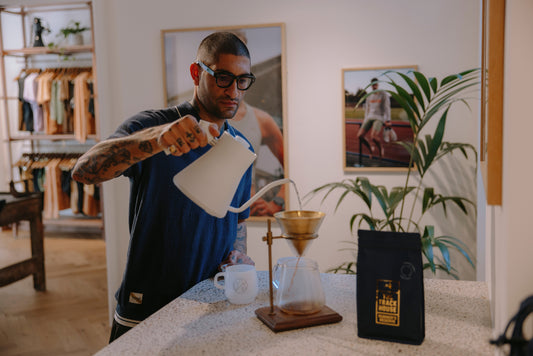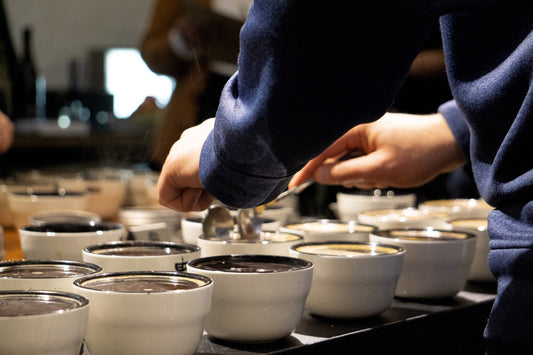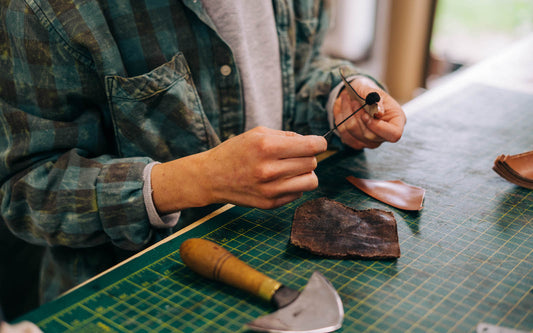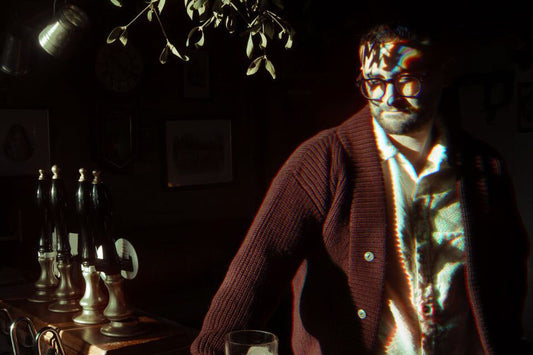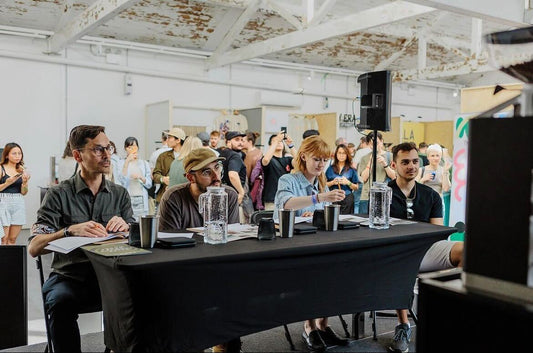As more of us brew coffee at home than ever before, we've collated various thoughts and conversations we’ve had amongst ourselves over the years on the subject of brew water. We hope the following will provide a guide to and through what is a dense and, at times, distracting topic in specialty coffee.
Our shared goal is to enjoy delicious coffee, so let’s look at getting the very best cups possible.
An unfinished product
Coffee is a unique product in many ways. Often compared to wine or chocolate, in that it can be cheap, simple and commoditised or a vastly complex, high quality ingredient, capable of delivering amazing flavours, coffee stands apart in that the actual drink only materialises right before it is consumed (with the exception of pre-canned cold brew options, but let’s leave discussion of those for another time).
The onus on the home brewer, making a cup for themselves or a pot for the family, to do right by their beans is greater than that felt when popping a cork from a nice bottle of wine or snapping a square off of a high quality chocolate bar. As a roaster that sells whole beans we’re asking the end consumer to carry the potential quality of their chosen coffee through into their cup. Armed with a good burr grinder, a robust recipe and some basic brewing advice this can be achieved quite easily, but there’s one more wrinkle that needs ironing out: water.

Don’t lose sight
Ultimately, there are certain properties that the water coming out of your tap might possess that will dampen some of the attributes that make specialty coffee so special.
By entering your postcode into your water supplier’s website, you should be able to read a report that breaks down what you’ll typically find in what’s coming out of your kitchen tap. Of particular interest will be the alkalinity, which you should think of as your water’s potential capacity to buffer your coffee’s perceivable acidity. Certain compounds will essentially work against you, making your coffee flatter and duller than it could taste brewed with different water.
So, if a bright, sparkly acidity is something you prize highly in your cup (we certainly do) this is something to be aware of.
Caveat Emptor: focussing too much on water can be a distraction.
The Music Analogy
Think of water as your hi-fi set up. Yes, you can spend thousands of pounds on the right turntable, needles, amplifier, cables, tweeters and woofers, and there are plenty who get a lot of joy from doing so.

Similar-minded groups of fervent brewers wishing to bring the same vigour and enthusiasm to their coffee brewing would be buying a home water distiller or the Zero Filter jug, and keep a stock of a couple of different mineral additives like Epsom salts - link and bicarbonate of soda - link). They can then create their own finely tuned brew water to recipe, to accentuate those attributes they find most appealing in their cup of coffee.
However, it is only those with a particular constitution and finely tuned ear who could lay down Curtis’s Roots on a more lo-fi sound system and find the music unlistenable and unenjoyable. Indeed, a lot of music producers and engineers often ‘car test’ their mixes as a way of ensuring a wider audience is able to listen and enjoy their music on more basic music systems. They may well concede that it won’t be at apex quality through such a system, but they wouldn’t eschew ever listening in the car. Similarly, well roasted, clean, fresh tasting coffee will give the drinker a huge amount of pleasure across a range of waters. There’s enough richness and depth when drinking coffee to allow some slide when it comes to your water quality.
To stray from one multimedia analogy and into another, you are allowed to watch The Irishmen on your phone, despite what Scorsese says.

What are my options?
The music analogy can only take us so far. There are definitely times when untreated water used to brew quality coffee may be like listening to music with severe fuzz and distortion over everything, whereby the music underneath cannot be heard and enjoyed, in comparison all the positive flavours in the coffee are no longer perceivable.
At what point does poor water quality result in a flavour defect in the cup rather than something sub-optimal? If all of the positive aspects of a cup are getting knocked around by the minerals in your water, creating something indiscernible from a poorly roasted, commodity coffee brewed with the same water, then steps do need to be taken to reclaim the characteristics that make specialty coffee special, and worth the extra time, effort and cost.
 [1] Bring Your Own Bottle
[1] Bring Your Own Bottle
I’ve jumped straight over bottled water. It’s undoubtedly a solution, but not a sustainable one, so I recommend purchasing one or two reusable bottles and visiting your local specialty coffee shop. They’ll be treating their water to reduce scale buildup in their machinery and make their coffee taste better.
On the off-chance you get funny looks or are uncomfortable asking for this you could always offer them some money each time you fill up, as it will cost them to treat their water. But if you’re buying your beans from there too, they’ll no doubt be open to helping you get the best out of them. We’re always open to sending you home with great brewing water when you visit a Workshop Coffee bar.
Obviously this isn’t an option during the current state of lockdown, but if you plan to keep brewing coffee with gusto and enthusiasm when we’re open again, keep this option in mind.

[2] Take the edge off
Filter jugs are mainly designed for taste and odour. They clean up the overall character of your water, but you don’t have ultimate control over your water’s buffering potential or overall hardness. Most regular household filter jugs like the Brita are very effective when the cartridges are fresh. Over time they do less work to improve your water quality before ultimately needing replacing.
Another option from BWT will improve taste and odouor, but also replace some of the mineral content in your water with magnesium, which is a very buzzy topic in the specialty coffee world due to its potential to highlight more sweet, fruity characteristics in your brew. We have found that magnesium rich profile waters can make distinct coffees taste a little monotonous, ultimately resulting in sweet and round cups but that can taste quite similar to each other. They also take a lot longer to “break in” than Brita jugs, whereby the first few litres of brewed coffee can taste a little weird before things start to get tasty. Once broken in however we’ve had undoubtedly sweet and complex cups of coffee that are leagues ahead of cups of the same coffee brewed with untreated tap water.
Despite the limitations of both Brita and BWT filter jugs, in that the water quality will fluctuate throughout their usage, they are a fantastic addition to your brewing repertoire for a very reasonable amount of money. Comparing cups of coffee brewed with untreated tap water and cups brewed with both Brita and BWT filtered water it is very easy to see their benefit. You can even return spent filter cartridges to certain shops for recycling.
[3] Fully customised
Making your own water is an extreme option, but you wouldn’t be alone in doing so.
As mentioned above, a home distiller or the Zero filter jug will create water completely devoid of minerals. By adding your own minerals, which requires a very accurate scale to 0.00g fidelity, you can experiment with different water profiles to get the very best out of your coffee. Different coffee roasters may even share their water specs so that you can recreate the very same water they use to assess and tweak their roast profiles. This option is maybe not quite as decadent as buying bottled mineral water to brew with, but does allow you to fall fairly deep down the rabbit hole and explore the complexities and intricacies of water.
[4] Adapt
Heresy? Not quite.
The obstacle of imperfect water coming out of your tap for coffee brewing is not insurmountable. Just like how a slightly dull set of grinder burrs or a slightly darker roast can be managed through adjusting your recipe and technique, you can work with your tap water rather than against it to create a sweet cup of coffee.
If your water is muting acidity and creating more bitter, flat and stewed characteristics, then limit the potential for this by using a stronger dose and aiming for a slightly lower extraction overall. This will ultimately accentuate acidity and brightness, which may express as sour in soft, clean, neutral water, but that unbalanced acidity will be rounded out and bridled in the harder water. You’ll also reduce bitterness by curbing extraction, which is achieved by using a fractionally coarser grind, slightly cooler water, coupled with your slightly higher ratio of coffee to water.
What does that mean in practice? Here’s what would usually be a one-cup V60 recipe made with clean, soft water, made using the Wilfa Svart, adapted for tap water:
Recommend Brew Guide (Clean, Soft Water)
1. 18g of coffee ground at the first 'R' in 'AEROPRESS' on the Wilfa Grinder.
2. Clean, soft water brought to the boil.
3. Start your timer.
4. Bloom for 30s with 50g of your water and stir fully.
5. Add all of your 300g of water by the 2 minute 30 second mark.
6. Drink, savour and enjoy.
Tap Water-Adapted Brew Guide
1. 20 of coffee, ground 2 clicks before 'AEROPRESS' on the Wilfa Grinder.
2. Tap water, brought to the boil.
3. Start your timer.
4. Bloom for 30s with 50g of water, but don't stir.
5. Add all of your 300g of water by the 2 minute mark,
6. Drink, savour and enjoy.
The changes are relatively small, but the impact they’ll have on the attributes in your cup will be more than noticeable, allowing you to regain some clarity and definition in the flavours you’re looking to find.
There are other implications of using tap water, primarily its effect on your equipment in terms of scale build-up. That’s nothing some quick and basic maintenance tips can’t address, and we’ll be covering those in another Journal piece.
In the meantime, if you want to get in touch please email betterbrewing@workshopcoffee.com for advice on how to get the very best out of your coffee.
Share:



